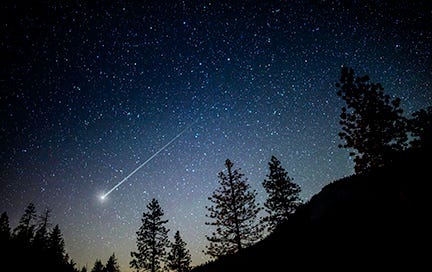Astronomy
In the middle of January, Mr. Brock launches an Astronomy unit. He is young and freckled with a mop of red hair that flops into his face with the enthusiasm of a puppy. He’s a science teacher with the energy it takes to engage eighth graders who are too cool for school.
Breathlessly, he introduces the solar system, our galaxy, the ever-expanding universe. We learn that every particle of matter and energy in the universe came into existence at the moment of the Big Bang. We grapple with the concept of infinity. How could something infinitesimally small, infinitesimally dense, hold all that is and will ever be?
He assigns nightly homework: Go outside after dark and observe the night sky.
That’s it.
Look up.
Outside.
Every night.
Six inches of snow blankets the town over the weekend. Arctic air reaches a long cold finger into the middle of Indiana. After dinner, I clear the table, load the dishwasher, wipe the counters, and sweep the floor. My parents retreat to the TV room downstairs. My sister pours over homework upstairs in our bedroom. My brother stretches the spiraling telephone cord into a stick-straight line to reach the far corner of the living room where he talks to his girlfriend in low, intermittent murmurs.
I layer on outdoor clothing, slip into snow pants and flannel-lined boots, stretch a knit hat over my ears, and encircle my neck with two scarves: one under my coat, and one across my nose and mouth. I pull up my hood, zip my coat, and call the dog. Rusty trots over and stands in puzzled stillness as I attach his leash. He tilts his head as I pull on mittens. We’re going outside?
I close the door on light and warmth and crunch through the snow into the backyard. I stop and look up. “You’ll see more if you get away from sources of light,” Mr. Brock had told us. Rusty and I walk further from the house, and I drop onto my back into a patch of untouched snow. I sink in and stretch out my arms and legs. Cold hovers around me, but I feel warm. Rusty settles down next to me, his head heavy on my chest.
Trees stand like sentinels at the far edge of the yard. Their bare branches frame a wide circle of night sky filled with specks of light; some bright, some dim, some twinkling, some constant. I recognize Cassiopeia, the Big and Little Dippers, the North Star, and Orion. Each speck is a sun like ours, or even bigger. Planets spin and moons orbit in invisible gravitational fields. Mr. Brock told us about red and blue giants, white and black dwarves. He told us that thousands of stars burned out or exploded long ago, but their light still travels toward us, reporting billions of years of existence.
I listen to my slow, steady breath like a metronome.
It is the only sound.
I experience the peace of air flowing in and out of my lungs.
It is the only movement.
My body relaxes into the snow’s snug embrace.
I repeat this solitary ritual every night for weeks. I love every part of it: layering, Rusty, the cold, the snow, my breath, the vastness of the night sky, and my tiny spot on this small planet. I’m disappointed when the stars are hidden by clouds, and a little resentful when the moon shows up to steal the show. A snow squall presents its own kind of wonder. Each flake is like a photon of light speeding toward me from a far-off star. They melt on my nose and deliver miniature electric sparks to my outstretched tongue. Mr. Brock instructs us to sketch the moon each night, and I delight in its changing shape and position. Science becomes a study of awe and wonder.
Before I have the words to describe it, I know I am the stuff of stars.
About the Author
Linda Castronovo lives and writes in western Massachusetts, ancestral land of the Nipmuc and Pocumtuck People. She makes her home with her husband, a yellow lab, a black cat, and five chickens on a tiny hobby farm with fruit trees, berry bushes, and too many weeds. Nature is still a daily wonder.






